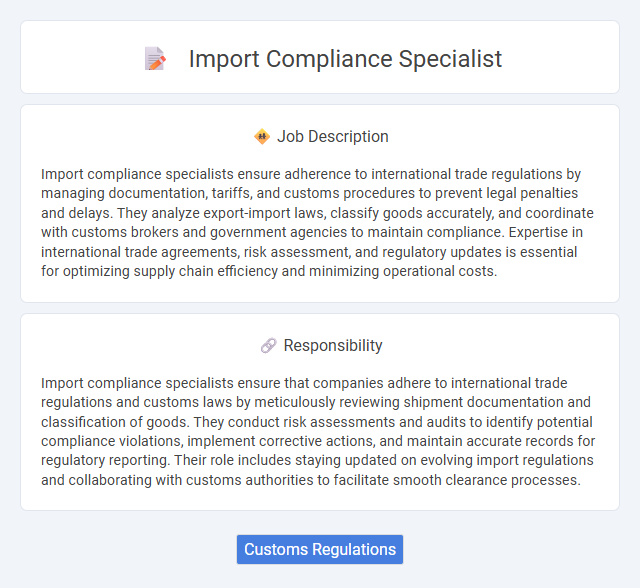
Import compliance specialists ensure adherence to international trade regulations by managing documentation, tariffs, and customs procedures to prevent legal penalties and delays. They analyze export-import laws, classify goods accurately, and coordinate with customs brokers and government agencies to maintain compliance. Expertise in international trade agreements, risk assessment, and regulatory updates is essential for optimizing supply chain efficiency and minimizing operational costs.
Individuals with strong attention to detail and a solid understanding of international trade regulations are likely to be well-suited for an import compliance specialist role. People who thrive in structured environments and enjoy ensuring adherence to complex legal requirements may find this job rewarding and a good fit for their skills. Those who struggle with bureaucracy or intricate documentation might face challenges in meeting the demands of this position.
Qualification
An Import Compliance Specialist requires in-depth knowledge of international trade regulations, customs laws, and import/export documentation to ensure company adherence to global compliance standards. Proficiency in using customs management systems and familiarity with tariff classification, duty rates, and trade agreements are essential qualifications. Strong analytical skills and attention to detail help identify compliance risks and streamline import processes effectively.
Responsibility
Import compliance specialists ensure that companies adhere to international trade regulations and customs laws by meticulously reviewing shipment documentation and classification of goods. They conduct risk assessments and audits to identify potential compliance violations, implement corrective actions, and maintain accurate records for regulatory reporting. Their role includes staying updated on evolving import regulations and collaborating with customs authorities to facilitate smooth clearance processes.
Benefit
Import compliance specialists likely enhance a company's ability to avoid costly penalties by ensuring adherence to international trade regulations. They probably improve supply chain efficiency through accurate documentation and risk assessment. Hiring such specialists may result in better negotiation leverage with customs authorities and reduced delays in import processes.
Challenge
The role of an import compliance specialist likely involves navigating complex regulations and constantly evolving international trade laws, which can present significant challenges. Ensuring that shipments meet all customs requirements and avoiding costly penalties or delays might require meticulous attention to detail and up-to-date knowledge. The probability of encountering unexpected issues with documentation and regulatory changes could make problem-solving a frequent and essential aspect of the job.
Career Advancement
Import compliance specialists ensure adherence to international trade regulations, reducing risks of costly penalties and delays. Mastery of customs laws, tariff classifications, and documentation processes opens pathways to roles such as customs auditor, trade compliance manager, or global logistics director. Continuous certifications like CIPP (Certified Import Professional) and developing expertise in supply chain security enhance prospects for leadership positions and strategic responsibilities within multinational corporations.
Key Terms
Customs Regulations
An Import Compliance Specialist ensures adherence to complex customs regulations to facilitate the smooth importation of goods while minimizing legal risks and penalties. Expertise in classifying products according to the Harmonized Tariff Schedule and managing documentation such as customs declarations is essential for compliance with U.S. Customs and Border Protection (CBP) requirements. Continuous monitoring of updates in international trade laws and enforcement of government import restrictions play a crucial role in maintaining efficient supply chain operations.
 kuljobs.com
kuljobs.com